- Home
- David R. George III
Crucible: McCoy Page 9
Crucible: McCoy Read online
Page 9
“Jim,” McCoy said, twisting the chair around to look up at the captain, but the words he thought to say next died in his throat. You’re wrong, he wanted to say. I am to blame for Spock’s blindness. No one else. But the expression on Jim’s face, his entire posture, stopped him. On top of being responsible for the well-being of his crew and, right now, the million inhabitants of Deneva, the captain had lost his brother and sister-in-law, had nearly lost his nephew, and in another way would soon lose his best friend; Spock’s blindness would doubtless take him away from his service aboard the Enterprise. The last thing Jim needed at this point was to have McCoy’s guilt heaped upon him. “You’re right,” the doctor said. “But I feel bad for Spock.”
“I know,” Jim said. “I know.” He patted McCoy’s shoulder, and saying nothing more, departed.
The doctor watched him go, then stood up and left sickbay himself. He would not allow his guilt to prevent him from being a good friend, he’d decided. He headed for the turbolift, on his way to visit Spock.
On the bridge’s primary communications console, a green rectangle winked to life on the readout, indicating an incoming transmission. Uhura recognized the call sign and frequency at once, which told her that the signal had originated in Deneva’s capital city, Verian, from within the government hub. She tapped at her controls, verifying reception and requesting sender identification. She received a voice message in response, which she routed to her earpiece: “Helena Albrecht.”
“Captain,” Uhura said, turning from her console to face the command chair, “I have an incoming transmission from Governor Albrecht.”
“Put it on the main viewer, Lieutenant,” Kirk said.
Uhura marched her fingers across her panel, pressing the appropriate buttons to establish two-way visual communication with the governor’s office and to send the incoming visual component to the bridge’s central viewscreen. The controls twittered in response beneath her long, slender fingers.
When Uhura had finished, she peered past the captain, past Lieutenant Sulu and Lieutenant Hadley at helm and navigation, and over at the main viewer. She watched the blue-white image of Deneva fade, replaced by the now familiar sight of Ms. Albrecht standing beside her desk. The slight-framed, towheaded woman looked out from a scene marked by apparent disorder: a monitor visible on a credenza behind her displayed only an interference pattern; one of two curtains covering a large window had been pushed untidily aside; and varicolored stacks of data cards sat heaped on seemingly every available surface. Uhura thought that the governor herself looked disheveled and tired, the cerulean, lace-edged sweater she wore a mass of wrinkles, her eyes full of a heavy weariness despite the small smile she managed.
“Governor,” Captain Kirk said, “how are the verification efforts proceeding?”
Until almost three weeks ago, just after the Enterprise had arrived at Deneva, Albrecht had served as the colony’s deputy governor. But once the Enterprise crew had begun eradicating the neural parasites, Governor Newton Armitage had been found dead, a victim of the alien invasion. Obviously understanding the peril the settlement faced, he had at the outset led a successful effort to destroy the colony’s small collection of ships, as well as the three vessels that had brought the creatures and scores of hosts here from Ingraham B. He had been beaten to death for those actions, actions which had doubtless helped prevent the spread of the parasites beyond Deneva.
“I’m very happy to tell you that we’re finished, Captain,” Albrecht said, a full smile blooming on her face for a few seconds. The news did not surprise Uhura, who had been charged over the past seventeen days with coordinating the status reports from Deneva. She’d worked with more than two dozen hospital administrators on the planet, and the Enterprise’s primary communications staff—Lieutenants Alden, M’Ress, and Palmer—to track the progress on identifying every single colonist and ensuring that they no longer carried parasitic tissue within them. Fortunately, sensor records had been found detailing the landings of the three vessels from Ingraham B, allowing Deneva officials to also account for and find the hosts that had come from there. “My assistant will be sending along the details shortly,” Albrecht continued, “but we’ve now examined every colonist, as well as the people who came here from Ingraham B. The parasites have been completely eradicated.”
“Excellent,” the captain said, clearly cheered by the news. “I’ll inform Starfleet Command.” After the light-generating satellites had been deployed, killing most of the creatures and freeing their hosts, the Enterprise crew had acted with local officials to set up examination centers in hospitals throughout the two dozen settlements that made up the colony. At the same time, the crew had undertaken a painstaking sensor sweep of the entire planet, seeking out any aliens that might have escaped. In all, fewer than a hundred surviving creatures had been found, and only a few thousand colonists had required additional treatments of light to kill the parasitic tissue within them.
“Captain, I want to thank you and your crew for everything you’ve done for us,” Albrecht said. “So many more lives would have been lost without your intervention, not just here on Deneva, but wherever the parasites would have spread.” Uhura knew that the last counts she’d seen had put the number of dead on the planet at close to twenty-one thousand, quite a number of whom had been infants and children. “I cannot express my appreciation enough,” Albrecht concluded.
“I only wish we could’ve arrived sooner, Governor,” Kirk said, “so that more lives could have been saved.” The colonists’ grief from the terrible loss of life had affected the Enterprise crew not only from afar, but also in a very personal way. Just three days ago, the captain had transported down with his nephew to Verian, where the two had attended a memorial service for Sam and Aurelan Kirk. The bodies of the captain’s brother and sister-in-law had been processed in a way common to Earth and to many of its colonies: they had been cremated, although owing to the parasitic tissue that had infested them, a decision had been made not to harvest their organs.
“I’m also very sorry for your own loss, Captain Kirk,” Albrecht said.
“Thank you,” he replied. “And I’m very sorry for yours.” Uhura assumed that the captain referred to all of the people who had perished on Deneva. For the third time in as many days, though, Uhura noticed that Captain Kirk’s demeanor had changed from what it had been for weeks prior. Even before the Enterprise had arrived at Deneva, really ever since the incident with the Guardian of Forever, he had seemed sullen and withdrawn, behaviors only reinforced by the deaths of his brother and sister-in-law, and the blinding of Mr. Spock. But since the memorial service, the captain had seemed more like himself, spending more time on the bridge, and interacting more often and more easily with the crew. She admired his strength.
On the main viewer, Albrecht inclined her head slightly and said, “Safe journeys to you and your crew, Captain.” Kirk returned the nod, and the image of the governor faded.
Uhura turned back to her panel and quickly restored the external view of Deneva to the screen. As she did so, she saw several other indicator lights flash in different colors on her panel. She reviewed them, worked her console to handle them as needed, listened briefly to a message on her earpiece, then informed the captain.
“Sir, I’ve received the final reports from Governor Albrecht’s assistant,” she said. “Also, Mister Scott confirms that the planet and the colonists are all clear of the parasites, and that, except for himself and Mister DeSalle, all of the crew have transported back aboard.”
“Thank you, Lieutenant,” the captain said. “Tell Mister Scott that we’re preparing to leave orbit as soon as he’s aboard. Have him report to the bridge once he’s beamed up.”
“Yes, sir,” Uhura said.
Less than thirty minutes later, the bridge doors opened, and along with Yeoman Zahra, Scotty stepped out of the turbolift. The two officers walked past the primary engineering console and descended down the two steps to the lower deck. Captain Kirk stood f
rom the command chair, and beside the helm station, faced the chief engineer. Zahra waited behind Scotty.
As Uhura completed a shift communications status on a data slate, she rose from her station to stretch her legs. She heard the captain as he expressed his approbation for the job Scotty had done over the past weeks, leading the Enterprise contingent that had assisted the colonists. The engineer thanked him, then returned to his bridge console, currently manned by Crewman Harrison.
“Yeoman,” the captain said, stepping over to Zahra, “record this for Starfleet Command.”
“Ready, sir,” the yeoman responded, activating the tricorder she carried.
“The alien creatures on Deneva have been destroyed—”
At the sound of the turbolift doors opening, Uhura glanced over in that direction. She felt her eyes widen in surprise as Zahra expressed what Uhura herself thought: “Captain, look: Mister Spock.”
Uhura’s stylus came up off her slate as she stopped writing. The first officer walked past her, toward the primary sciences station, his eyes open and apparently functioning. Dr. McCoy followed along behind him.
“Spock,” the captain said, not bothering to hide his shock. He moved over to the rise behind the command chair and peered up at the first officer. “You can see.”
Spock stopped and gave a slight nod, then looked from Kirk to McCoy, evidently prompting the doctor to provide the explanation. For her part, Uhura could not tear her gaze away from Spock. The advent of his condition had seemed tragic to her, especially given that it had happened to him in the service of finding a means of saving the people of Deneva and that it hadn’t been necessary. Now, his recovery astounded her.
“The blindness was temporary, Jim,” McCoy said. “Something about his optical nerves, which aren’t the same as a human’s.” The doctor’s tone carried a note of amused exasperation, something that had been lacking in recent days, and a marked return to form that Uhura welcomed.
“An hereditary trait, Captain,” Spock elucidated. “The brightness of the Vulcan sun has caused the development of an inner eyelid, which acts as a shield against high-intensity light.” Uhura had never heard of such a thing. Spock looked once more at McCoy. “Totally instinctive, Doctor,” he said. “We tend to ignore it, as you ignore your own appendix.” The first officer offered an expression that Uhura could only describe as self-satisfied—despite his claims to Vulcan dispassion—and then he continued on to the sciences station.
Uhura glanced up at McCoy, as did the captain. The doctor appeared pensive, but even in thought, his features lacked the tension she’d seen in them during their time at Deneva—since the death of Captain Kirk’s brother and sister-in-law, since Spock’s blindness. Uhura shared a look with the captain, and he too appeared more relaxed. Indeed, she thought she saw in his aspect the threat of mischief. He climbed to the outer, upper level of the bridge and followed Spock over to the sciences console.
“Mister Spock,” he said, clasping his hands behind his back, “regaining eyesight would be an emotional experience for most. You, I presume, felt nothing?”
To Uhura’s surprise, the Vulcan did not deny the emotion attendant with his restored ability to see. “Quite the contrary, Captain,” he said. “I had a very strong reaction: my first sight was the face of Doctor McCoy bending over me.”
Uhura looked from Spock to the doctor, whose harrumph and amused annoyance made it difficult for her not to laugh. “’Tis a pity brief blindness did not increase your appreciation for beauty, Mister Spock.”
“If you gentlemen are finished,” the captain said, descending from the outer portion of the bridge, back to his command chair, “would you mind laying in a course for Starbase Ten, Mister Spock?”
Between the friendly banter and the order that would take the Enterprise away from Deneva, Uhura could not help but smile. While Mr. Spock acknowledged the order and Dr. McCoy headed toward the captain, Uhura sat back down at her communications console, setting down her data slate and stylus atop an empty surface. She reached across her console and worked the controls, opening a channel to the main communications center on Deneva. She signaled the Enterprise’s departure, waited for acknowledgment, then ended the transmission.
Sitting back in her chair, Uhura felt a wave of relief wash over her, grateful to finally be leaving this place. The weeks dealing with the neural parasites had been intense and arduous, for none more so than Captain Kirk, Mr. Spock, and Dr. McCoy. But at least the destruction of the parasite menace, along with Spock’s unexpected recovery and the recuperation of the captain’s nephew allowed them to leave this place on a positive note.
Uhura picked up her data slate and stylus, resuming work on her shift status report. She looked forward to reaching Starbase 10, certain that the captain would authorize shore leave there, since the crew had endured so much during the last few months. Prior to the incidents on Deneva and with the Guardian of Forever, the Enterprise had been on the front lines of what had nearly become a shooting war with the Klingons, and before that, there had been the deadly search on Janus VI for the creature killing miners. Uhura also recalled the struggle to evacuate colonists from Omicron Ceti III; the attempt by a group of twentieth-century, selectively bred warriors, revived from suspended animation, to commandeer the ship; and the tensions the crew had undergone when the captain, Mr. Spock, and their landing party—as well as the entire ship’s complement—had been declared casualties in the computer-controlled war between Eminiar and Vendikar.
It’s been a demanding few months, Uhura thought as she locked down her station, routing communications to a secondary console. She made a notation on her slate, then initiated a diagnostic sequence on her panel. Though monotonous, she didn’t mind the work, preferring it to the reports from Deneva she’d coordinated, many of which had included updates on the number of dead found in the colony.
As Uhura monitored the diagnostic, she remembered her previous visits to Starbase 10. Designed like a pair of cones joined at their circular ends, the base boasted a large lake at its center. A beautiful esplanade ran beside the unusual feature, with shops and entertainment venues scattered along meandering paths. In particular, she recalled a nightclub, Starlight on the Water, which on some evenings invited amateurs to perform. Uhura thought now that perhaps she might do a little singing while on leave.
An indicator on the communications console flashed from green to yellow, and an instant later, to red. Uhura glowered at the light, set down her data slate once more, and began attempting to isolate the fault. Yes, she definitely would welcome a few days of rest and relaxation on Starbase 10.
McCoy finished running the shaver over his face, then ran a hand across his cheeks, chin, and neck, checking for any remaining stubble. He hadn’t missed any hair with the laser blades, though, feeling only smooth skin. He returned his shaver to the cabinet behind the mirror and above the basin, then headed out of the refresher, the narrow panel sliding closed behind.
Grabbing his boots from beside the bed, he sat down at his desk. After pulling on his footwear, he looked at the time currently displayed on his desktop monitor. He still had almost thirty minutes before the start of his duty shift in sickbay, plenty of time to stop at one of the mess halls for some breakfast.
On the monitor’s base, McCoy saw, a red light blinked on and off. He hadn’t heard any communications signals this morning, and then he realized that he hadn’t reviewed his messages when he’d come back to his cabin last night. Now, he reached forward and pushed a toggle, activating playback. The log revealed that he had only one message.
McCoy watched without surprise as Tonia’s image appeared on the screen. “Leonard, I was wondering if you’d like to have dinner together tonight,” she said. McCoy felt a twinge of guilt. “We haven’t seen much of each other lately, so…well, I miss you.” She glanced down briefly, as though unsure of herself. When she looked up again, she quickly finished. “Well, that’s it,” she said. “Let me know.” Tonia smiled with an effort
that seemed forced, and then the screen went dark. A moment later, the current time reappeared on the monitor.
Regret swelled in McCoy, both for not responding to Tonia’s message in a timely manner, and for the truth of what she’d said. They hadn’t spent much time together recently; they’d only shared a couple of meals during the Enterprise’s stay at Deneva and had gotten together only once in the week since the ship had started for Starbase 10, having a celebratory dinner right after Spock had regained his eyesight.
McCoy sighed, already feeling weary, even though his day had just begun. He reached for another toggle on the monitor, knowing that he should contact Tonia right now, perhaps even invite her to join him for breakfast. Even though he didn’t—
The door signal sounded. McCoy sat back in his chair, supposing the obvious, that Tonia hadn’t waited to hear back from him, had instead decided to pay him a visit. He rubbed at his eyes, again feeling fatigued, and hoping that his failure to contact Tonia last night would not lead to some sort of confrontation right now. Regardless, he could not leave her standing in the corridor. “Come in,” he called.
The door panel glided open, and as had happened not too long ago, McCoy saw that he had mistakenly guessed his caller to be Tonia, when it actually turned out to be Spock. The first officer stepped forward into the cabin, and the door closed behind him. “Doctor,” he said, “I wish to solicit your personal and medical opinions on an issue, but I am not prepared to do so as a matter of record.”
“Well, good morning to you too,” McCoy said in mock irritation. When Spock did not respond at all, offering no perfectly logical retort, or a remonstrance of any kind, but simply stood there motionless, the doctor saw that he must have something serious on his mind. “What is it, Spock?” he said. “You know you can talk to me.”
“Yes, I do know that, Doctor,” Spock said. “But it is proper that I inform you of my desire to keep our discussion private, given that it is about the captain that I wish to speak.”

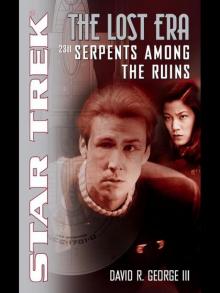 Serpents Among the Ruins
Serpents Among the Ruins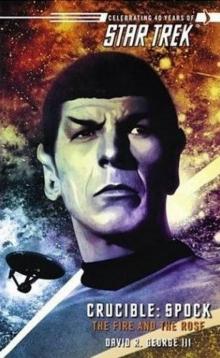 The Fire and the Rose
The Fire and the Rose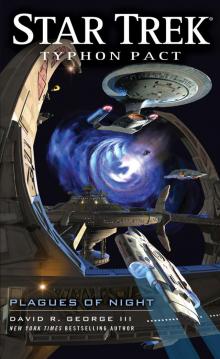 Star Trek: Typhon Pact 06: Plagues of Night
Star Trek: Typhon Pact 06: Plagues of Night Star Trek: The Lost Era - 08 - 2319 - One Constant Star
Star Trek: The Lost Era - 08 - 2319 - One Constant Star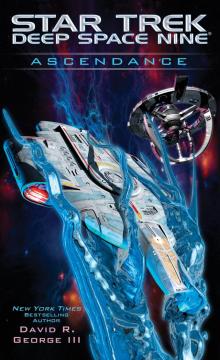 Star Trek: Deep Space Nine: Ascendance
Star Trek: Deep Space Nine: Ascendance Star Trek: TOS: Allegiance in Exile
Star Trek: TOS: Allegiance in Exile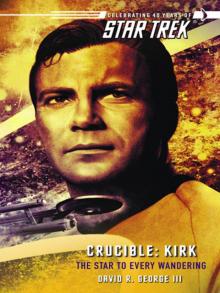 Crucible: Kirk
Crucible: Kirk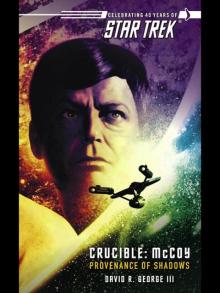 Crucible: McCoy
Crucible: McCoy The Long Mirage
The Long Mirage Original Sin
Original Sin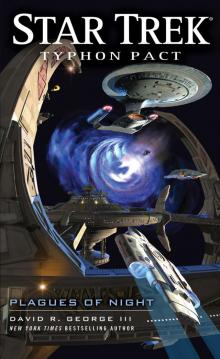 Star Trek: Typhon Pact: Plagues of Night
Star Trek: Typhon Pact: Plagues of Night Allegiance in Exile
Allegiance in Exile Sacraments of Fire
Sacraments of Fire Star Trek: Typhon Pact: Rough Beasts of Empire
Star Trek: Typhon Pact: Rough Beasts of Empire Star Trek: The Fall: Revelation and Dust
Star Trek: The Fall: Revelation and Dust